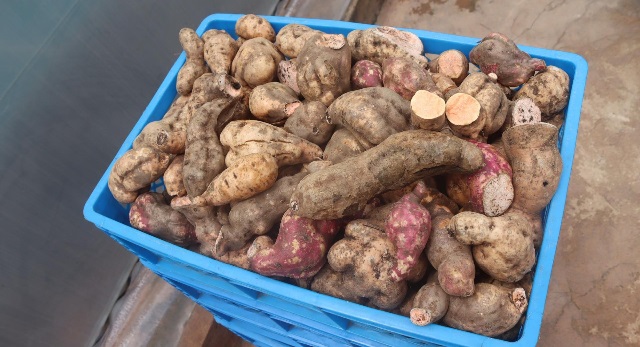
Kabale, Uganda | THE INDEPENDENT | Farmers in Kigezi region have shunned the orange-fleshed sweet potato, a variety which was introduced to fight malnutrition among children.
The orange-fleshed sweet potato provides a much-needed boost to the immune system and helps prevent serious conditions like early-onset blindness. Nutritional experts say that eating orange sweet potatoes improves vitamin A in children, yet its deficiency increases the risk of severe morbidity from common childhood infections such as diarrhoea and measles.
The districts of Kabale, Rubanda, Rukiga, Kisoro and Kanungu in Kigezi sub-region were selected by the Agriculture ministry to participate in the growth of the vitamin-rich orange sweet potato. This was part of the harvest plus program which is supported by the International Food Policy Research Institute and Farm Radio International to end hunger by providing nutrient-rich foods.
However to date, the farmers are yet to fully pick the interest in the variety. Miria Tugume Akankwasa, a farmer from Butanda sub-county in Kabale district acknowledges that she has never planted the orange sweet potato variety because of low interest and lack of vines. She says that even though the agriculture ministry placed vines at some government primary schools’ demonstration farms, several farmers never picked interest in them.
Jackeline Tumushabe, a resident of Rwamucucu sub-county in Rukiga district says that they are not more than 30 farmers in the sub-county who are growing the orange sweet potato variety. Tumushabe says that many farmers have refused to grow the potato variety arguing that other local varieties are sweeter. She also says there is low sensitization about the benefits of the variety.
Rukiga District Chairman Robert Mbabazi Kakwerere says that local farmers have glued on growing their indigenous varieties because they fear that the orange sweet potato has no market. He also says that farmers still have a myth that their indigenous varieties can withstand weather and climatic conditions compared to orange sweet potatoes.
Kabale District Production and Marketing Officer Beda Mwebesa says that after realizing that farmers are struggling to embrace the variety, they have opted for a new strategy of creating rapid multiplication of vines so that they become more available to the farmers.
Alex Rwakuba, the Commissioner of Crop Production in the Ministry of Agriculture, Animal Industry and Fisheries (MAAIF) attributes the low uptake of the variety to lack of information, adoption of new technologies, and innovations in farming. Rwakuba says that farmers still think that their indigenous varieties are enough to sustain agriculture.
He says that there is still a need to sensitize farmers about the adoption of the orange sweet potato variety.
Julius Twinamatsiko, the Project Coordinator of the Uganda Multi-Sectoral Food Security and Nutrition project insists that despite the low adoption of the Orange Fleshed Sweet Potato by farmers in Kigezi, cases of malnutrition have reduced from 40 percent in 2016 to 22 percent in 2021. He also says that cases of anaemia among children below 5 years have reduced from 50 percent in 2016 to 40 percent to date.
*****
URN
 The Independent Uganda: You get the Truth we Pay the Price
The Independent Uganda: You get the Truth we Pay the Price


